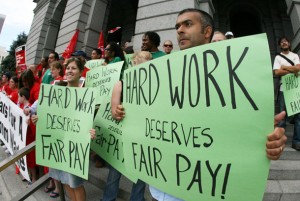By Alec Zucker
With the U.S. economy still struggling after the worst recession since the Great Depression, President Obama presented a series of ambitious proposals to spur economic growth in his 2013 State of the Union address. One of these notable measures was an increase in the federal minimum wage from $7.25 to $9 an hour. The President pointed out that individuals working full time at the current minimum wage earn on average only $14,500 annually, a yearly income that is well below the federal poverty line.

To combat this harsh reality, Obama asserted that the minimum wage increase would raise the incomes of millions of poverty-stricken families, boost consumer demand, and allow many households to become less dependent on social welfare programs such as Food Stamps and Medicaid. Furthermore, the President proposed indexing the minimum wage to inflation. He also advocated in favor of adjusting the wage based on changes in the cost of living, in order for the wage to be sufficient for families to live on. As expected, Obama’s desire to raise the minimum wage came under scrutiny from both sides of the aisle, and it also spawned much debate between liberal and conservative economists about whether a higher minimum wage has negative consequences for employment.
Critics of Obama’s minimum wage hike claim that the increase raises labor costs on firms, which leads to employee layoffs and hinders job creation. The theoretical explanation for this phenomenon, similar to the explanation for structural unemployment discussed in class, is that a minimum wage increase may create a binding price floor, in which the mandatory minimum wage is higher than the equilibrium wage.
At this new arbitrary wage, the supply of labor exceeds the demand for labor. Therefore firms are forced to lay off workers, as their demand for labor is less at this new actual wage and also cannot hire additional workers at this prevailing wage. Michael Saltsman, research director at the Employment Policies Institute, predicts that the President’s minimum wage hike would lead to serious job losses and could derail the recovering economy if enacted.
Disgruntled members of the business community, like Saltsman, frequently cite recent research completed by economists at Cornell and American University who found that Obama’s minimum wage increase would eliminate over 467,000 jobs and would not significantly reduce poverty as intended. Many conservatives urge for the abolishment of the minimum wage altogether, as this would, they claim, allow the market to effectively determine the equilibrium hourly wage and, therefore, ensure a balance between the supply of labor and the demand for labor in each industry.
Proponents of Obama’s minimum wage increase tout the benefits of the proposal, such as higher incomes for the working poor and enhanced consumer demand, and also dispute the claim that a higher minimum wage significantly reduces employment. A study completed in 2010 by Dube, Lester and Reich attempted to identify the potential effects of minimum wage increases on earnings and employment across various states.
The economists found that their results “suggest no detectable employment losses from the kind of minimum wage increases (they) have seen in the United States.” Furthermore, the Center for American Progress synthesized five different academic studies that focused on minimum wage increases and concluded that minimum wage increases of 7 to 12.3 percent made during periods of high unemployment had no significant effect on employment levels. In fact, the study reviewed increases in state minimum wages and found that these increases at the statelevel have not killed jobs and that job growth in these states has actually been higher on average.
Due to the fact that both sides of this argument have multiple studies that support their positions, it is difficult to conclusively declare whether a minimum wage increase significantly reduces employment. Before doing research on this topic, my preconceived notions led me to believe that the benefits of an increase in the minimum wage outweigh the costs. However, after reading a paper by John Schmitt of the Center for Economic Policy and Research, I have concluded that the verdict, on whether a higher minimum wages causes unemployment, is inconclusive because there are, according to Schmitt, a variety of ways the labor market and employers can react or adjust to a minimum wage increase, some of which do not involve laying off workers.
Schmitt asserts that firms, in response to a minimum wage increase, can choose to cut back on the hours and benefits of employees, cut wages for higher paid workers to offset the additional labor cost, raise prices, settle for lower profits, become more efficient and/or lay off employees. He concludes that it is nearly impossible to distinguish the precise response made by firms in an aggregate measure, since it depends on each particular firm. Therefore, it is difficult to formulate a conclusion because there are so many factors involved.
In turn, some firms may decide to lay off employees, while others may choose alternative courses of action that could possibly lead to an increase in employment (if the benefits of less worker turnover and increased productivity are realized). All in all, the public debate on the impact of a minimum wage increase on employment will likely continue until more conclusive research on the possible relationship — research that would be deemed credible by both sides is presented.






